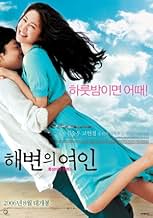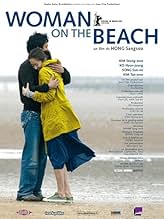NOTE IMDb
6,8/10
1,5 k
MA NOTE
Un réalisateur fait venir un ami à la plage sous le prétexte d'écrire un scénario. Il entame alors une liaison avec la petite amie de celui-ci.Un réalisateur fait venir un ami à la plage sous le prétexte d'écrire un scénario. Il entame alors une liaison avec la petite amie de celui-ci.Un réalisateur fait venir un ami à la plage sous le prétexte d'écrire un scénario. Il entame alors une liaison avec la petite amie de celui-ci.
- Récompenses
- 8 victoires et 7 nominations au total
Avis à la une
I confess to not having seen any of this director's films, but on the basis of this, I probably won't bother. This is the story of a writer/director with writers block who basically treats women like garbage so he can find his muse and regain his creativity. Actually, he treats just about everyone in this film like garbage.I guess it is hero worship, because I couldn't understand why these seemingly intelligent women would fall for this fairly obnoxious, boorish individual. Set on a resort beach in Korea seemingly out of season, there is very little to do, so the lead character becomes mean to everyone around him. Perhaps the maker of this film felt the point was that there are two kinds of people, those who give and those who take. The two women the lead character spends time with are pathetic. I had high hopes for the character Moonsook, who in the beginning showed promise. She should have been a stronger character. The director keeps calling her very pretty/beautiful (see is pretty, but not beautiful), but then he treats her like dirt, calling her stupid twice. He gives writers a bad name. If the filmmaker's idea was to assuage some guilt he himself has, fine. He should have made a better film. This film is full of forced, vacuous dialog. I know I'll probably be in the minority on the opinion on this film, but I am a big Asian film fan and this one left me cold. Many times I pondered leaving the theater. In the audience of about 20 people there were maybe three chuckles from the dialog. I'd like to see the actress who plays Moonsook in another role. She probably is a good actress, but her character is useless. I shook my head a little at the people who were waiting in line for the next showing. If you're a fan of this filmmaker, maybe you're used to his kind of storytelling. I wanted to like it, and the reviews were mostly favorable. Mine isn't, regrettably.
A film director with writer's block leaves the city of Seoul to finish his script at a Korean seaside resort. An entanglement with two women, however, reveals his inner confusion and forces him to confront his self-defeating behavior. Hong Sang-soo's latest, Woman on the Beach, is a comedy drama about love and the complications that develop in relationships when one partner is less than candid with the other. Like the films of Eric Rohmer, Woman on the Beach is simple on the surface yet explores a deeper layer of complexity in human relationships that is insightful and revealing.
As the film opens, director Joong-rae (Kim Seung-woo) travels to Shinduri Beach on Korea's West Coast hoping to renew his inspiration. He brings along his production designer Chang-wook (Kim Tae-woo) and Chang-wook's girl friend Moon-sook (Ko Hyeon-geong), a composer of popular songs. It becomes clear almost immediately that Moon-sook is enamored with the director and the two soon sneak away from Chang-wook and find an empty hotel room where they exchange vows of love. On the surface, she is a strong, independent woman, while Joon-rae gives the appearance of a calm and confident artist, yet both are rebounding from previous relationships and are very vulnerable.
When the morning comes, Joong-rae's warm emotions of the previous night have turned chilly. Unable to confront the feelings that reminded him of his failed marriage, he feigns anxiety and asks to be driven back to the city, leaving a phone message for Moon-sook. When he returns to the seaside after a few days, on the pretense of asking for an interview for his film, he meets Sun-hee (Song Seon-mi) who resembles Moon-sook. They spend the afternoon and night together, exchanging vows of affection, similar to those given to Moon-sook.
When Moon-sook comes looking for him in a drunken rage, however, he has to confront his deceptions and the tangled web he was woven. Woman on the Beach is a thoroughly engaging film with sparkling dialogue, complex characters, and outstanding performances from the lead actors. If it leaves us with a touch of sadness about people's inability to connect, it also leaves us smiling about their resilience and capacity for joy. Though Hong's characters are flawed, we identify with their weakness because they are all too human and may even reflect our own failings.
As the film opens, director Joong-rae (Kim Seung-woo) travels to Shinduri Beach on Korea's West Coast hoping to renew his inspiration. He brings along his production designer Chang-wook (Kim Tae-woo) and Chang-wook's girl friend Moon-sook (Ko Hyeon-geong), a composer of popular songs. It becomes clear almost immediately that Moon-sook is enamored with the director and the two soon sneak away from Chang-wook and find an empty hotel room where they exchange vows of love. On the surface, she is a strong, independent woman, while Joon-rae gives the appearance of a calm and confident artist, yet both are rebounding from previous relationships and are very vulnerable.
When the morning comes, Joong-rae's warm emotions of the previous night have turned chilly. Unable to confront the feelings that reminded him of his failed marriage, he feigns anxiety and asks to be driven back to the city, leaving a phone message for Moon-sook. When he returns to the seaside after a few days, on the pretense of asking for an interview for his film, he meets Sun-hee (Song Seon-mi) who resembles Moon-sook. They spend the afternoon and night together, exchanging vows of affection, similar to those given to Moon-sook.
When Moon-sook comes looking for him in a drunken rage, however, he has to confront his deceptions and the tangled web he was woven. Woman on the Beach is a thoroughly engaging film with sparkling dialogue, complex characters, and outstanding performances from the lead actors. If it leaves us with a touch of sadness about people's inability to connect, it also leaves us smiling about their resilience and capacity for joy. Though Hong's characters are flawed, we identify with their weakness because they are all too human and may even reflect our own failings.
Needing a quiet, relaxing environment in which to complete the script for his latest film, well-known director Kim Jung-rae heads to a largely deserted seaside resort with his friend, Won Chang-wook, and Won's beautiful girlfriend, Kim Mun-suk. Tensions quickly develop when Kim and Mun-suk become romantically involved with one another, leaving the erstwhile Won as essentially odd-man-out. Yet, terrified of making any kind of long term commitment, Kim backs away from Mun-suk at a crucial moment, causing a serious rupture in their relationship. It's only after a second woman comes into the picture that Mun-suk returns to the beach town, further complicating Kim's already complicated life - though providing possible fodder for the script he's having such a hard time completing.
Slow-moving, episodic and hypnotic, the Korean drama "Woman on the Beach" is wonderfully perceptive about human nature and the multi-faceted and complex ways in which people relate to one another. It's virtually impossible to pigeonhole any of the characters since they often act and react in ways that surprise and intrigue us. Director Sang-soo Hong relies largely on extended conversations to tell his story, an approach which allows the drama to unfold in a thoroughly naturalistic fashion, without having to resort to melodrama or contrivance to get its points across. To that end, the movie is filled with numerous seemingly irrelevant, off-the-cuff moments (including the final scene) that add immeasurably to the verisimilitude of the piece. As a result, every moment in the film feels unscripted and real, an illusion greatly enhanced by the excellent performances of Seung-woo Kim, Hyun-jung Go, Seon-mi Song and Tae-woo Kim.
Finally, the shuttered hotels and sparsely populated beaches and boardwalks provide an eerily appropriate backdrop for this tale of an individual so haunted by the demons and ghosts of his own past that he finds it difficult to live in the present.
Slow-moving, episodic and hypnotic, the Korean drama "Woman on the Beach" is wonderfully perceptive about human nature and the multi-faceted and complex ways in which people relate to one another. It's virtually impossible to pigeonhole any of the characters since they often act and react in ways that surprise and intrigue us. Director Sang-soo Hong relies largely on extended conversations to tell his story, an approach which allows the drama to unfold in a thoroughly naturalistic fashion, without having to resort to melodrama or contrivance to get its points across. To that end, the movie is filled with numerous seemingly irrelevant, off-the-cuff moments (including the final scene) that add immeasurably to the verisimilitude of the piece. As a result, every moment in the film feels unscripted and real, an illusion greatly enhanced by the excellent performances of Seung-woo Kim, Hyun-jung Go, Seon-mi Song and Tae-woo Kim.
Finally, the shuttered hotels and sparsely populated beaches and boardwalks provide an eerily appropriate backdrop for this tale of an individual so haunted by the demons and ghosts of his own past that he finds it difficult to live in the present.
10erahatch
There are only a handful of filmmakers working today of whom it can truly be said that each film of theirs takes us into a world instantly recognizable as the product of that filmmakers' mind. Claire Denis certainly comes to mind, as do such masters as Aleksandr Sokurov, Kim Ki-duk, Tsai Ming-liang, Catherine Breillat, and Michael Haneke.
Although his films haven't rec'd the same distribution in the U.S. as those esteemed names mentioned above, add Hong Sang-soo to that list. I've loved everything I've seen from him -- especially Woman Is The Future of Man -- but it was seeing Woman on the Beach recently at the Toronto Film Festival that confirmed him in my mind as one of the most assured hands in film today. His vision of modern life -- neurotic, self-obsessed urban adults still struggling with childish hang-ups as they attempt to balance careers and relationships with lust and alcoholism -- comes through vividly in this film, first with washes of warm humor and later with squrim-worthy insights into modern relationships.
It's tempting to make a comparison to Woody Allen in his late-'70s prime, and yet the humor here is subtler and more complex, with a sly contemporary sophistication all its own -- and the humor gives way to resonant drama more naturally than in most of Allen's work. Some characters get only a minute or two of screen time, yet feel more alive to me than leading characters in lesser films. What's more, it's also an exquisitely shot film, with an emotionally evocative setting likely to stick in your mind long after the lights come up.
Other than Apichatpong Weerasethakul's "Syndromes and a Century," a film just as effective and affecting (although in very different ways), "Woman on the Beach" was the film that stood out to me the most from the 15 or so I saw at this year's Toronto Int'l Film Fest. Both films are film-art of the highest order, the kind of rich, challenging art-house fare that Wellspring would have given a U.S. theatrical run were they still around. Perhaps someone else will step up to the plate -- Palm Pictures, maybe, or Plexifilm? Here's hoping; movies like this one deserve to be seen all over the world -- and not just on home video!
Although his films haven't rec'd the same distribution in the U.S. as those esteemed names mentioned above, add Hong Sang-soo to that list. I've loved everything I've seen from him -- especially Woman Is The Future of Man -- but it was seeing Woman on the Beach recently at the Toronto Film Festival that confirmed him in my mind as one of the most assured hands in film today. His vision of modern life -- neurotic, self-obsessed urban adults still struggling with childish hang-ups as they attempt to balance careers and relationships with lust and alcoholism -- comes through vividly in this film, first with washes of warm humor and later with squrim-worthy insights into modern relationships.
It's tempting to make a comparison to Woody Allen in his late-'70s prime, and yet the humor here is subtler and more complex, with a sly contemporary sophistication all its own -- and the humor gives way to resonant drama more naturally than in most of Allen's work. Some characters get only a minute or two of screen time, yet feel more alive to me than leading characters in lesser films. What's more, it's also an exquisitely shot film, with an emotionally evocative setting likely to stick in your mind long after the lights come up.
Other than Apichatpong Weerasethakul's "Syndromes and a Century," a film just as effective and affecting (although in very different ways), "Woman on the Beach" was the film that stood out to me the most from the 15 or so I saw at this year's Toronto Int'l Film Fest. Both films are film-art of the highest order, the kind of rich, challenging art-house fare that Wellspring would have given a U.S. theatrical run were they still around. Perhaps someone else will step up to the plate -- Palm Pictures, maybe, or Plexifilm? Here's hoping; movies like this one deserve to be seen all over the world -- and not just on home video!
Hong Sang-Soo reminds me a lot of Eric Rohmer, which seems to be a comparison many have made before. But I would definitely rank him quite below Rohmer. I've seen four films by Hong now. I liked the first one I saw, Woman Is the Future of Man, a lot, but the other two, besides the one about which I'm currently writing, I only barely recall. Woman on the Beach seems far too similar to Woman Is the Future of Man for me to like it a lot. I didn't hate it, by any means, though I did eventually grow tired of it. I liked the initial conflict, where a man brings along a woman whom he thinks of as his girlfriend on a trip with a film director friend of his. The director is kind of a jerk, and the girl is immediately attracted to him either that, or she is so bothered by the meek guy that she just wants to spurn him. Later on, she discovers that the director's jerkiness is a pretty clear character trait. Well, duh. Much as I remember from Woman Is the Future of Man, Hong's major insight seems to be that men (particularly film directors) are jerks, and that women like jerks, but also think they can change them. It's a pretty trite observation, really, and, in the end, kind of hateful toward both sexes. It doesn't help that the woman becomes a completely jealous shrew. If I'm remembering correctly, I liked the woman of Woman Is the Future of Man much better. She seemed, in the end, better and stronger than the men in her life.
Le saviez-vous
- ConnexionsFeatured in Ebert Presents: At the Movies: Épisode #1.21 (2011)
Meilleurs choix
Connectez-vous pour évaluer et suivre la liste de favoris afin de recevoir des recommandations personnalisées
Détails
- Date de sortie
- Pays d’origine
- Sites officiels
- Langue
- Aussi connu sous le nom de
- Mujer en la playa
- Lieux de tournage
- Sociétés de production
- Voir plus de crédits d'entreprise sur IMDbPro
Box-office
- Montant brut aux États-Unis et au Canada
- 23 686 $US
- Week-end de sortie aux États-Unis et au Canada
- 4 250 $US
- 13 janv. 2008
- Montant brut mondial
- 813 813 $US
- Durée
- 2h 7min(127 min)
- Couleur
- Mixage
- Rapport de forme
- 1.85 : 1
Contribuer à cette page
Suggérer une modification ou ajouter du contenu manquant


























